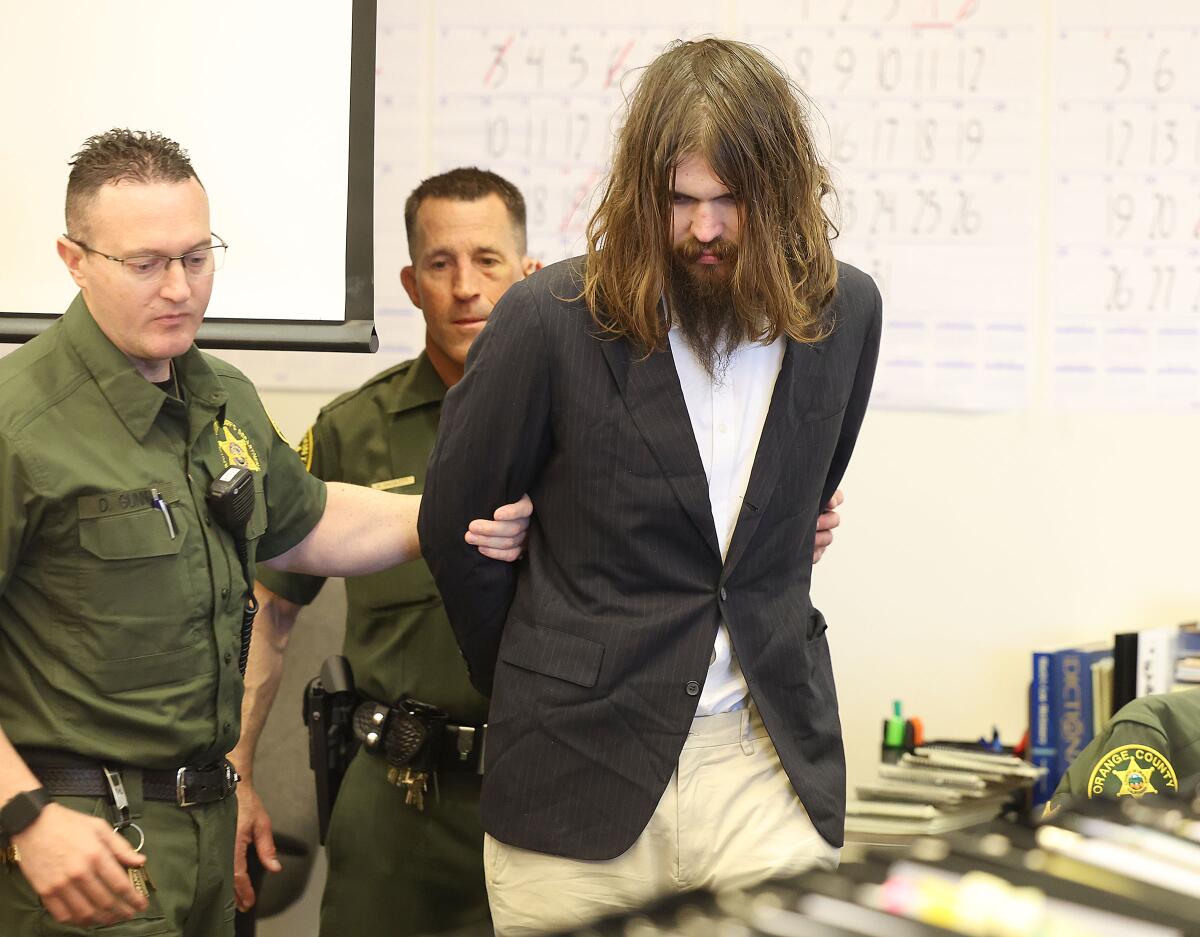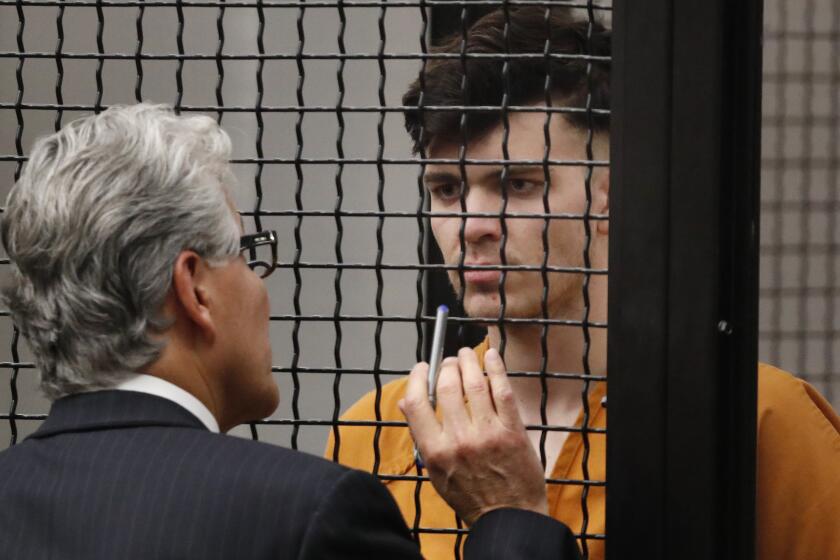Samuel Woodward’s attorney admits his client killed a gay Jewish teen but denies it was a hate crime

- Share via
Alienated, lonely and “starved for validation,” Samuel Woodward found a brief sense of acceptance in the Atomwaffen Division, which preached America’s imminent collapse and consciously targeted the ostracized and bullied for recruitment, Woodward’s attorney said Tuesday.
In his opening statement at Woodward’s murder trial, Assistant Public Defender Ken Morrison acknowledged that his client was responsible for the death of 19-year-old Blaze Bernstein, who was Jewish and gay. But despite Woodward’s association with Atomwaffen, which is considered a hate group, the attorney insisted Woodward was not driven by bigotry and had not premeditated the killing.
“What happened that night, plain and simple, was not a hate crime,” Morrison told jurors in Orange County Superior Court in Santa Ana.
Woodward, 26, faces a charge of first degree murder with a hate crime enhancement for Bernstein’s death. He will face life in prison if convicted as charged.
Bernstein, a student at the University of Pennsylvania, was home with his family for the holidays in Lake Forest when he disappeared on Jan. 2, 2018. A week later, his body was found under a thin layer of earth in nearby Borrego Park. He and Woodward had attended the Orange County School of the Arts together.
“The ‘why’ is the single most important issue you will need to decide — not who,” Morrison said. “Blaze Bernstein’s sexual orientation had absolutely nothing to do with the reason he was killed. ... [He] was not killed because of who he was but because of what he did to Sam Woodward after they met up.”
Morrison did not explain what he meant about Bernstein’s actions. Instead, he painted a picture of his client — who sat at the defense table in a dark suit with unkempt dark hair hanging over his face — as a socially awkward young man who suffered for years with undiagnosed autism spectrum disorder and could not make friends.
Bernstein was Jewish and gay, while Samuel Woodward, according to one of his attorneys, was conflicted about his sexuality.
“His ASD went undiagnosed and untreated for almost his entire life,” Morrison said. Woodward’s parents “wanted so badly for Sam to appear normal and fit” and thought perhaps “by force of will and prayer, they could help him appear normal.”
Woodward thrived as an Eagle Scout but was tormented by his sexuality, raised in Newport Beach in an “unaccepting household” by a conservative Catholic family, with a father who considered homosexuality a sin, the defense attorney said.
After briefly attending Cal State Channel Islands, Woodward moved back in with his parents. He became involved in the Atomwaffen Division, traveling to a “hate camp” the group hosted in Texas and posing for a photo with James Mason, author of “Siege,” regarded as the group’s bible.
Disputing what he called the prosecution’s “hyperbolic, sensationalized” narrative of “Nazi kills gay Jew,” the defense attorney said Woodward did not kill Bernstein in service of the group or its ideology.
Assistant Dist. Atty. Jennifer Walker told jurors that Woodward was so involved in the Atomwaffen Division that he devised tests for potential recruits to test their knowledge of its doctrines, and that he had killed Bernstein “because he was gay.”
On Dec. 19, two weeks before the killing, Woodward drew a skull and a bloody knife on a napkin and scrawled the words “text is boring but murder isn’t,” the prosecutor said.
Woodward’s diary showed that he liked to prank gay people on social media by pretending he was bicurious, attracting their attention and then threatening them. The prosecutor said Woodward applied the principles of his Eagle Scout training to targeting Bernstein.
“If it’s fishing, what type of lure are you going to use?” Walker said. In this case, “the prey ... was gay people.”
The men exchanged flirtatious messages on Jan. 2. Woodward said that although he was straight, “I might make an exception for you.” Woodward picked him up in Foothill Ranch soon after, and Bernstein’s parents became alarmed when he missed a dental appointment the next day.
When the parents reached Woodward, alerted by their son’s social media activity that Woodward was probably the last to have seen him, Woodward said that he had hung out with Bernstein but that Bernstein had walked off into the park without him.
On Jan. 4, Woodward texted Bernstein’s father: “Mr. Bernstein, it’s Sam — has there been any word about Blaze?” The father replied, “Thanks Sam. We are still looking for him.”
Investigators searched the park for a week, but Bernstein’s body was not discovered until heavy rains washed away just enough mud to expose him. He had 28 stab wounds, Walker told jurors, many of them to his neck, with defensive wounds on his hands. “Blaze fought for his life as best he could,” she said.
Sheriff’s investigators later found Bernstein’s blood on Woodward’s watch, on a folding knife discovered in his desk and on a sleeping bag stashed beside his house. In addition, Woodward’s cellphone pings showed him moving around the area of the burial just before midnight on Jan. 2.
Morrison had not finished his opening statement by the end of court Tuesday. He said he expects to put Woodward on the stand. The trial will resume Wednesday and is expected to last till the end of June.
More to Read
Sign up for Essential California
The most important California stories and recommendations in your inbox every morning.
You may occasionally receive promotional content from the Los Angeles Times.












